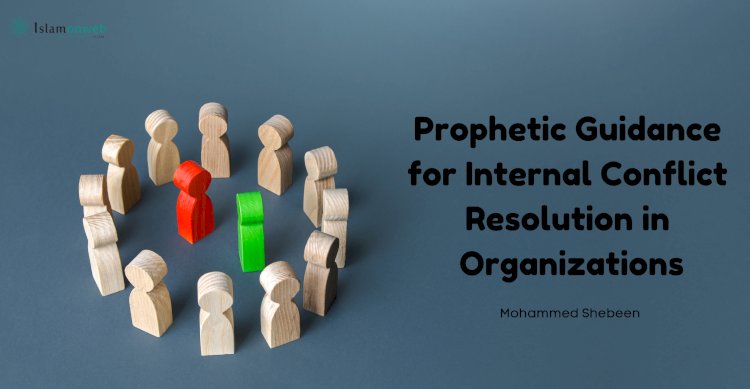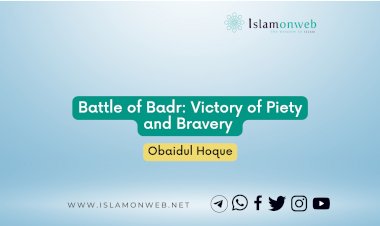Avoiding Preconceived Negative Thoughts: Prophetic Guidance for Internal Conflict Resolution in Organizations
Throughout his life, Prophet Muhammad ﷺ imparted profound wisdom through his teachings and actions. Among these is a Hadith where the Prophet ﷺ advised his companions against bringing negative reports or criticisms of other companions to him. This Hadith reflects the Prophet's deep understanding of human behaviour, group dynamics, and leadership. In today’s context, whether in religious organisations, political institutions, or corporate environments, this wisdom remains relevant, particularly when addressing issues related to internal conflicts, gossip, and factionalism.
The Hadith: A Call for Avoiding Negative Speech
The Hadith in question is reported in Sahih Muslim where the Prophet Muhammad ﷺ said: "Do not bring to me reports about my companions because I want to meet each of you with a clean heart (without any preconceived negative thoughts)." *(Sahih Muslim, Book 32, Hadith 6309)*
This Hadith highlights two important aspects:
- Guarding Against Negative Bias: The Prophet ﷺ expressed his desire to maintain a neutral and unbiased view of each of his companions. He did not want his perception of them to be tainted by one-sided reports or judgments from others.
- Promoting Unity and Harmony: By discouraging the spread of negative information about others, the Prophet was protecting the unity and harmony within the Muslim community. He understood that such reports could lead to division, suspicion, and mistrust among his followers.
The Relevance of the Hadith to Grouping, Factions, and Internal Conflicts
Internal conflicts, factionalism, and negative group dynamics are challenges that have existed throughout human history. They are prevalent in various types of organizations, be they political, religious, or corporate. This Hadith speaks directly to the root cause of many of these issues: the circulation of negative opinions, rumors, or unfounded reports about others. These behaviors often contribute to the formation of cliques, factions, or groups that can disrupt the unity and effectiveness of the larger organization.
- Political and Religious Organizations: The Threat of Factionalism
In political and religious settings, group conflicts often arise due to differences in opinion, ideology, or personal ambitions. The Prophet Muhammad’s ﷺ command to avoid spreading negative information about others is particularly pertinent in such contexts. When individuals within a political or religious movement begin to speak ill of each other, it leads to the formation of internal factions or caucuses, often with competing agendas.
For example, in political parties, members may criticize each other behind closed doors, creating tensions and rivalries. In religious communities, doctrinal disagreements can quickly escalate into personal conflicts when members speak ill of one another. In both cases, the result is division, weakened solidarity, and sometimes even the collapse of the organization.
The Prophet ﷺ understood that negative speech breeds distrust and resentment, which can erode the foundation of any group or community. By advising his companions not to inform him of negative reports, he was discouraging a culture of gossip and slander, which could easily spiral into factionalism.
- Corporate Organizations: Internal Politics and Gossip
In corporate organizations, office politics and gossip are frequent causes of internal conflict. Employees who engage in spreading rumors or negative stories about their colleagues often foster a toxic work environment. This behavior can lead to the formation of cliques or groups that prioritize personal gain over the success of the organization.
The Prophet’s advice is especially relevant in such settings, as it promotes the idea of focusing on the positive aspects of others and maintaining a clean heart when interacting with colleagues. When managers and employees refrain from indulging in negative speech, they create an atmosphere of trust and collaboration, which is essential for the success of any organization.
The Psychological and Social Impact of Negative Reports
Negative speech, rumors, or gossip about others can have a profound psychological impact, not only on the individual being talked about but also on the person receiving the information. When individuals hear negative reports about others, it shapes their perception, often leading to bias and prejudgment. In the workplace or community, this can hinder relationships and create unnecessary conflict.
By saying, “I want to meet each of you with a clean heart,” the Prophet Muhammad ﷺ was encouraging his followers to give each person a fair and unbiased chance. He recognized that once negative opinions are formed, they are difficult to overcome and can color all future interactions with that individual.
In the context of leadership, this Hadith teaches that a leader must strive to maintain an unbiased and impartial view of their team members. Leaders who are constantly fed negative reports about their subordinates will struggle to lead effectively because their judgment becomes clouded. This is especially true in political and religious organizations, where leaders are often the target of various interest groups attempting to sway their decisions by presenting negative reports about others.
Avoiding Gossip and Negative Speech: A Practical Approach to Organizational Unity
The Hadith offers a timeless lesson for anyone in a leadership role or part of an organization: refrain from indulging in gossip or sharing negative information about others. Instead, it encourages:
- Positive Communication: Focus on the strengths and positive attributes of colleagues, companions, or subordinates. This helps foster an environment of mutual respect and collaboration.
- Conflict Resolution: If disagreements arise, address them directly with the individuals involved rather than speaking negatively about them to others. This promotes transparency and helps resolve issues before they escalate.
- Fair Judgment: Leaders and managers should avoid forming opinions based on second-hand information or rumors. They should strive to interact with each person based on their own experience and knowledge of the individual.
- Protecting Unity: Whether in a religious group, political party, or corporate organization, unity is critical to success. Avoiding gossip and negative speech helps preserve the collective harmony and prevents the formation of harmful factions or groups.
Historical Context: Sahaba and the Early Muslim Community
This Hadith was particularly significant in the early Muslim community, as the Prophet Muhammad ﷺ had companions from diverse backgrounds, each with different strengths, weaknesses, and personalities. Among them were the Muhajirun (migrants from Mecca) and the Ansar (the helpers from Medina), who worked together to build the foundation of the Islamic state. Despite their differences, the Prophet always sought to maintain unity and foster mutual respect between these groups.
At times, conflicts or misunderstandings would arise between the companions, as is natural in any community. However, the Prophet ﷺ discouraged his followers from coming to him with complaints or negative remarks about others. For example, it is reported that when some companions tried to complain about Usama ibn Zaid, the Prophet’s response was, “Do not slander Usama, for I love him.” This shows the Prophet’s commitment to protecting the integrity and reputation of his companions, ensuring that his view of them remained untainted by gossip or negativity.
Conclusion
The Hadith of Prophet Muhammad ﷺ advising his companions not to bring negative reports about others to him holds invaluable lessons for modern-day leadership, whether in religious, political, or corporate contexts. By avoiding negative speech and focusing on fostering unity, leaders can prevent internal conflicts, factionalism, and group politics from tearing their organizations apart.
In an era where rumours, gossip, and slander can easily spread through social media and other platforms, this Hadith serves as a strong reminder to guard our words and interactions with others. Just as the Prophet sought to meet his companions with a clean heart, free from bias and prejudice, we too should strive to foster an environment of mutual respect, trust, and collaboration in all areas of life.
About the author:
Mohammed Shebeen T. Shabu is an accomplished academic with a Master’s degree in International Finance (M.Com), having qualified for the NET-JRF. He is currently pursuing a Ph.D. in Commerce at the University of Madras.
Disclaimer
The views expressed in this article are the author’s own and do not necessarily mirror Islamonweb’s editorial stance.
























Leave A Comment